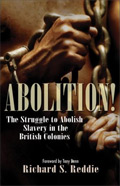You are here: Reports » Phase 1: media » Reviews » Abolition!...
Abolition! The Struggle to Abolish Slavery in the British Colonies
Author: Richard S. Reddie
Year: 2007
Publisher: Oxford. Lion Hudson.

Abolition! The Struggle to Abolish Slavery in the British Colonies provides a study of the transatlantic slave trade and the abolition movement in Britain during the eighteenth and early nineteenth centuries. The book covers a number of factors but focuses on the Christian beliefs of the abolitionists and resistance fighters as a force for the ending of the slave trade. Reddie attempts to revise a number of ingrained historical perceptions in his work; however, his main focus on the work of the abolitionists undermines his attempts to have an African-centred retelling of the past.
Reddie structures his book to ensure that the reader is aware of the tone and message of the book at the outset. Stating his involvement with the Anglican Church and his Caribbean heritage, Reddie asserts, 'my approach to detailing the development and ultimate end of slavery has therefore been undertaken from a black Atlantic Caribbean Christian perspective' (Reddie 2007: 16). This is not presented as a biased history however; Reddie makes this admission as a statement of fact as a necessary methodological stance in this historical analysis. This is indeed perhaps the most overt communication of his methods, as although Reddie makes reference to a 'holistic approach' in his work, to make a, 'fulsome connection between Europe, Africa and the Americas', this is never really expanded upon. The Christian interpretation of the past however is evident throughout the book, manifested in his judgements, descriptions and conclusions. For instance, Reddie (2007: 15) compares the abolition campaign in Britain and France, concluding that, 'the lack of a clear religious dimension to French life was the reason for this lack of activity.' Reddie (2007: 155) paints a pictures of a time when religion was banished from the world; 'economic forces would also triumph over religion when it came to harvesting the ripe sugarcane, which took over a year to grow but had to be harvested in a few days�a clash between God and Mammon.' Reoccurring phrases insist the reader remembers the abolition in a particular manner; 'the role of religion ought not to be excluded from this' (Reddie 2007: 196); 'religion was also central to the Jamaican uprising of 1831' (Reddie 2007: 218). The admonishment of the Anglican Church, of which Reddie himself is a prominent member, is considered and dismissed as the context of this 'godless' time is made apparent. 'It would be very easy to pass judgement on these so-called men of God for their moral failings; however, any criticism must be tempered with the realization that they were living in debased societies where violence and terror held sway' (Reddie 2007: 153). Religion is viewed as the primary cause of the abolition movement, an area which Reddie (2007: 14) believes has been neglected by historians, as he highlights a tendency of historians to 'play down altruism.'
This perceived neglect by historians is another feature of Reddie's work as he repeatedly highlights what he views as the absence of historical study in key areas; 'an extraordinary feature of the recounting of transatlantic slavery is the way Africans have been sidelined from their own history' (Reddie 2007: 13). Reddie (2007: 13) accuses 'some academics' of participating in a form of 'institutionalised racism', as they are considered to have, 'tended to present Africans as passive victims of slavery who waited for God and white men to deliver them from enslavement' (Reddie 2007: 13). This 'institutionalised racism' is also perceived by Reddie (2007: 14) in the language used by academics; 'to solely use the term 'slave' is to collude with the oppressive system that sought to rob Africans of their individuality and humanity.' Whether this is a fair assessment of the work of historians is definitely debatable and Reddie is certainly open to accusations of setting up a straw man for his own polemic purposes. What is interesting to note however is that Reddie (2007: 25) aims to address the imbalance by offering examples of civilisations in Africa in Egypt and Nubia before the advent of the transatlantic trade in enslaved Africans. These are still however examples of civilisations which have been valorised because of their study by Europeans. Reddie doesn't offer a non-European perspective in which to value and appreciate cultures in Africa before the violent transportation of millions across the Atlantic. This participation in what might be described as a 'colonial project' is evidenced when Reddie (2007: 25) speaks of implementing an 'African BC and AD.' The claim to represent 'the other', whilst propagating a system which has been sanctified by European society, might be seen to undermine Reddie's claims. Especially so when it is considered that African history ends a third of the way through the book, whereas the lives and works of abolitionists in Britain is celebrated throughout. It is the abolitionists and their religion that is ultimately Reddie's concern, as the bicentenary of the transatlantic trade in enslaved Africans is offered as an opportunity to renew faith. 'The bicentenary, therefore, is an occasion for men and women of all ethnicities and religions in the spirit of the original abolitionists to work together to end the negative legacies of slavery as well as commit themselves to ending modern day slavery' (Reddie 2007: 234-235).
Reddie's book appears well-researched, though its insistence on a particular approach to the study of the past could be seen to continue the traditional focus on the abolitionists at the expense of the consideration of the enslaved.
